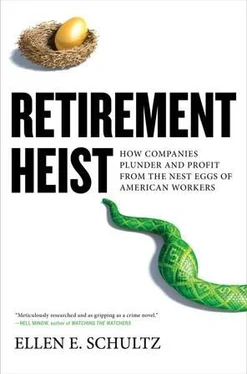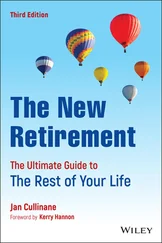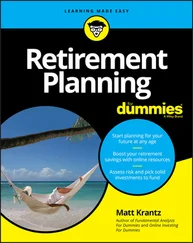Initially, insurers figured this was a good move: Higher-income employees tend to have longer life expectancies, which meant the policies would eventually be worth more. But the strategy could backfire. They failed to consider that covering a group of people in one place carries additional mortality risk. After the September 11 terrorist attacks, Hartford Life Insurance reported an after-tax charge of $2 million related to the attacks. This didn’t mean that Hartford paid out only $2 million; this was how much Hartford lost on having written the policies. Companies like Aon, the giant risk manager and insurer that lost 176 employees in the World Trade Center, reaped tens of millions in death benefits. [12] Of course, Aon also provided group and executive policies benefiting the victims’ families, which it purchased from other insurers. To be clear, Aon and other companies aren’t celebrating when they receive death benefits; they’re taking out the policies to benefit from the ability to shelter investments in them from taxes, and for the accounting benefits.
The mass death of heavily insured executives and other employees in the Trade Center attacks was a wake-up call to insurers about the amount of financial exposure they had when there was a high concentration of insureds in a single location. In 2003, at the annual Society of Actuaries meeting in Washington, D.C., a Towers Perrin group-pricing actuary noted that insurers had begun requiring employers to provide not only the ages and Social Security numbers of employees, but also their work addresses, so the employer could assess the potential financial risk of multiple casualties from mass shootings, terrorist attacks, building collapses, and other disasters.
Janitors insurance doesn’t kill people, but it strikes many people as unseemly, if not creepy, which may explain why the sellers and buyers of the insurance aren’t eager to talk about it. Such reluctance to discuss a practice that accounts for one-third of life insurance sales might make CFOs take pause. If they really thought the practice was appropriate, it would be highlighted in the annual report.
A string of lawsuits in Texas beginning in the 1990s, in which employers have been steadily on the losing end, shows that when the practice is put before a jury (a Texas jury, at least), companies have good reason to worry.
One of the earliest suits involved the death of William Smith, in 1991. The twenty-year-old was working at a Stop N Go convenience store in Pasadena, Texas, for extra Christmas money when a robber shot him dead. Angela Smith, his eighteen-year-old widow, who was still in high school, was touched when the company offered her and her one year-old son, Brandon, a payment of $60,000.
Normally, if a worker is killed on the job, his family receives death benefits from the state workers’ compensation system. But to save money, the store’s owner, Houston-based National Convenience Stores, didn’t participate in the program. Still, to protect itself from the cost of wrongful death or negligence lawsuits arising from workplace deaths, it took out life insurance on its clerks. The policy, from Lloyd’s of London, paid NCS $250,000 after William Smith died.
Angela Smith sued NCS in state court anyway, alleging violation of Texas’s insurable-interest rules and seeking payment of the COLI money to Smith’s estate. In 1999, the court awarded the estate $456,513, which included insurance, attorney fees, and interest. NCS appealed that judgment, and in 2002 agreed to settle with Smith for $390,000. Valero Energy Corp., in San Antonio, acquired NCS and its COLI policies in 2001, through its acquisition of Ultramar Diamond Shamrock Corp., which had earlier bought NCS.
In a similar case in 1998, in which a family challenged whether NCS had an insurable interest in the deceased employee, the company argued that it did, indeed, have an insurable interest in its workers because, without workers, “NCS would not generate revenue and would cease to exist as a viable entity.” The Texas court in that case suggested that NCS consider liability insurance.
A Texas jury was also unimpressed with an employer’s claim that it had an insurable interest in a part-time employee. Peggy Stillwagoner was a temporary employee who had been at her job only two months when she died in 1994. A nurse, she had been on her way to a home-care appointment when another driver slammed into her Geo Metro. She underwent emergency surgery, but died soon after. She was fifty-one.
Facing tens of thousands of dollars in medical bills, Stillwagoner’s family asked her employer, Advantage Medical Services, if it provided any life insurance or other benefits. The owner of the company said it didn’t. But a few months after the accident, when an insurance company investigator contacted Peggy’s husband, Kenneth, asking him to sign papers releasing her medical records, he learned by chance that AMS held a $200,000 insurance policy on his wife’s life.
The family sued in state court, arguing that the company had no insurable interest in Peggy’s life, since she’d been replaced the day after her death. The family was seeking the benefit the company had collected upon her death. The company insisted that it did have an insurable interest, because the field nurse had the “opportunity to attract or create new business and was therefore a valuable employee.” The family lost in the lower court, but in late 1998 the appeals court reversed the lower court’s ruling and found that Kenneth Stillwagoner had a right to challenge the insurance payment to AMS. Subsequently, the company and Travelers Insurance Co., a unit of Citigroup Inc. that sold AMS the coverage, settled with the family for $395,000.
The bad publicity that lawsuits like these generated spurred lawmakers to draft fresh proposals to rein in the practice. In 2003, Congressman Gene Green, a Texas Democrat, proposed requiring employers to tell all employees, past and present, about any coverage bought on their lives since 1985. Once again, insurance lobbyists fought back. COLI provider Clark/Bardes and insurance-industry groups led the opposition, aided by Ken Kies’s lobbying practice, which Clark/Bardes had acquired. The industry took out radio ads in the Washington area attacking proposals to curb what it called “business insurance.” The proposals went nowhere.
But lawmakers continued to press for more restrictions on COLI, and in 2006 it appeared they had succeeded. Congress enacted new rules that limit companies to buying life insurance on just the top one-third of earners, who must provide consent.
But the rules turned out to be a boon to insurers and employers. For one thing, they specifically permit employers to buy life insurance on the top third of earners—those most likely to participate in deferred-compensation programs. This was the first time the law deemed the practice legal. (Insurance lobbyists aren’t paid top dollar for nothing.) And though the new rules require employers to obtain employees’ consent, the rules weren’t retroactive. Thus, companies still hold old policies covering millions of employees, including lower-level workers and former employees who aren’t entitled to benefits of any kind, as well as retirees. The rules don’t require employers to notify people covered prior to August 2006.
In fact, these “restrictions” fueled the sale of billions of dollars more in COLI. Banks led the way, not only because of the new rules but because banking regulators in the Bush administration specifically affirmed the use of life insurance to finance deferred compensation.
Banks took out billions of dollars’ worth of this life insurance during the mortgage bubble, when executive pay—and the IOUs for their deferred compensation—surged. By the end of 2008, banks had a total of $122.3 billion in life insurance on employees, nearly double the $65.8 billion they held at the end of 2004. (Unlike other companies, banks are required to disclose their total life insurance holdings in regulatory filings.)
Читать дальше












